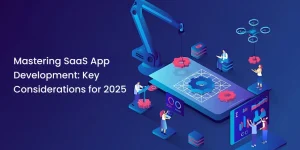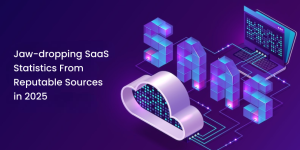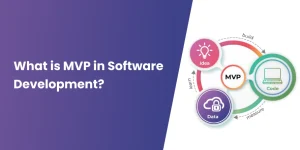White Label Software Development: What are The “Basics”?
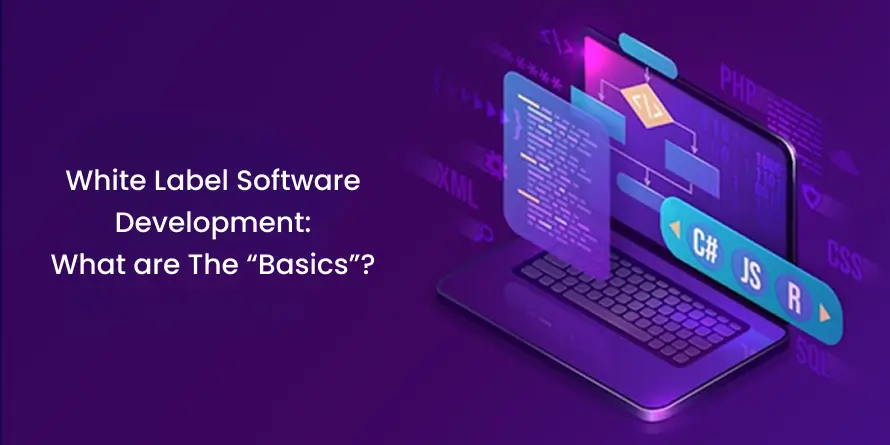
The mobile app market blooms with innovations, but for many businesses, the cost and development time can feel overwhelming and a roadblock to entry. White-label software development offers a fantastic alternative to this. By taking inspiration from an already successful brand and adding unique features and branding elements, you can launch a website, app, or software much faster and for a fraction of the cost.
However, is white-label software development a shortcut to success, or are there any limitations? This blog explores the world of white label apps, the pros and cons, and specific considerations you need to consider before deciding if it’s the proper roadmap for your business.
Key Takeaways
- White label app development reduces both development time and cost.
- White label apps allow faster entry into the market, grabbing market share quickly.
- Sometimes, white label apps face specific legal issues due to copyright or intellectual property concerns.
- Success in white label app development may rely heavily on the original app’s performance and brand value.
What Is White Label Software Development?
This model has become popular in on-demand and eCommerce industries, where businesses are looking for modern and customizable solutions to bring to the market quickly. This model proves successful when the startup or company lacks the resources and funds to develop its software from scratch. At the same time, labeling offers a way to deliver high-quality products without starting from zero.
Statista reports that the white label market will cost about $50 billion by 2025, creating the popularity of this market. With the growing SaaS market size worldwide, businesses are increasingly leveraging white-label SaaS platforms to enter the market faster and reduce development costs.
Common examples include white-label SaaS platforms, mobile applications, and eCommerce solutions.
The key advantage of white label solutions is that it helps companies deliver high-quality solutions, stay relevant, and save on the costs associated with designing, development, and testing.
How Does White Label Software Work?
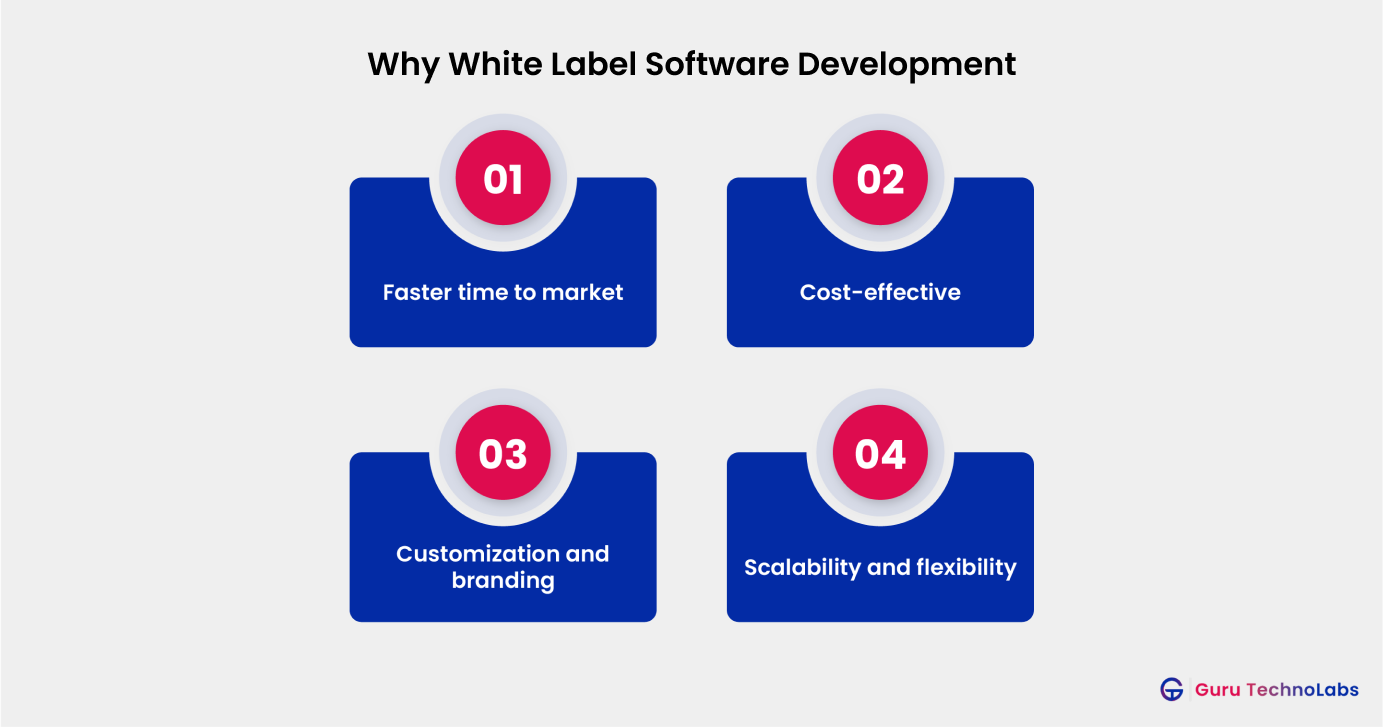
Understanding how white label software works is essential for businesses considering adopting this model. It is a concept in which one company directly purchases a software product from another and resells it using its name, logo, features, branding elements, and packaging.
This way, the buying company can offer the software to its customers as if it were a designed and developed product without developing it from scratch.
Even if you want to make some changes to a product, you can do it without informing the software company. Let’s take an example to understand the concept in a better way:
- Company A develops the software
- Company B buys the software, rebrands it, and sells it under its unique brand
- Client or customers directly buy the software from company B without any involvement of the company A
Opting for white label software is the best and most cost-effective way to get your software without spending huge bucks on resources. It also helps you accelerate the business growth and boost revenue. Now, let’s understand how the white label software business model works:
Development
- The development step is where the software is built from scratch by the original developer or vendor. The creator builds the software with advanced technologies, functionalities, and integrations.
- The product is fully featured, ready to launch, and often tested for performance and reliability.
- The software is developed at this stage and can be licensed to other businesses for rebranding and reselling.
Licensing and Customization
- Once the software is developed, the next step is licensing. The vendors provide a legal agreement allowing resellers the right to use the software commercially.
- This license typically allows the reseller to rebrand and distribute the software under their name.
- The terms of the license, including its duration, cost, and scope, are mentioned in the agreement.
This step ensures that the reseller has the legal right to sell the products.
Branding
- After receiving the licensed software, the reseller can begin the branding process.
- This involves customizing the software’s visual elements- such as logo, features, colors, and user interface – to match the reseller’s brand identity.
- The reseller might also add unique features or tools, depending on the license terms.
- This step ensures that the software appears as though it was developed by the reseller, helping them establish their own identity while still leveraging the core software provided by the vendor.
Sales and Support
- With the branded product ready, the reseller is now responsible for marketing, sales, and customer support.
- They promote the software to their audience, handle customer inquiries, and offer ongoing support.
- While the reseller manages day-to-day operations, updates, bug fixes, and improvements to the software are handled by the original vendor.
- This allows the reseller to focus on selling and customer service without worrying about technical maintenance, as the vendor maintains and improves the software in the background.
A great example of white label software is a payment processing platform. A well-known payment gateway company like Stripe might offer white label payment processing solutions, allowing businesses to integrate payment processing into their websites under their brand.
The end user doesn’t know that Stripe is behind the scenes, and the reseller profits by offering a seamless payment solution to their customer without developing the technology themselves.
Take The Headache Out Of Growing Your Business
We manage your technical part, and more so you can focus
on scaling your business.
What Are The Various Forms Of White-Label Software Available?
White label software makes waves across niches and forms, each with unique reasons for adopting this model. Since we have understood how white label software works, the next obvious question that comes into mind is how many types of white label software solutions are available in the market.
CRM and Marketing Automation
In this domain, white label solutions allow marketing agencies and consultants to offer branded tools that help their clients nurture relationships, automate marketing tasks and measure performance.
All under their brand will enhance the service provider’s value proposition and strengthen customer loyalty to your platform.
Social Media Management Software
This software can help manage, post, and respond to social media interactions. White-label social media platforms, frequently used by agencies and social media companies, allow businesses to brand an existing system by either using it as their own or reselling it to another business.
Vendasta and Sendible are two excellent examples of social media management platforms.
Mobile Applications
Countless mobile apps with advanced features and functionalities are available in the market.
You can white label almost anything you want, from taxi booking apps to payment processing, while white labeling is an economical way to get advanced solutions with no brand name attached.
White label mobile apps give businesses a chance to create something unique while drastically reducing the cost of app development and time to market. This approach is particularly beneficial in SaaS app development, where businesses can leverage pre-built frameworks to deliver high-quality cloud-based solutions with minimal effort.
Do you have a unique app idea? Refer to the below solutions:
- BuildFire
- AppSheet
- AppSumo
- StreamLXP
- Clappia
eCommerce Solutions
White-label eCommerce systems enable the rapid development of an online store. The platforms are capable of managing their marketing tools, payment systems, and inventory—all of which are prepared for quick deployment and rebranding.
Email Marketing
Email marketing is one of the most trending digital marketing strategies available. Platforms like MailChimp allow marketing agencies to offer email marketing solutions with custom templates, dashboards, and automated campaigns, all under one roof.
Landing Page Building
High-conversion landing pages are important for successfully paid marketing strategies. White label landing pages are builders that allow agencies to design, develop, and edit landing pages for clients without seeking help from the development team.
Landing page builders are projected to surpass $1.9 billion by 2032.
Project Management Tools
Among other essential functions, a white-label SaaS designed to function as a project management tool enables scheduling, project planning, and asset and task management. This software can be used by stakeholders, team leaders, and members to manage the working process, documentation, and asset documentation, among other things.
It is anticipated that these tools will be worth about $25.3 billion by the end of 2034. This white-label software helps resellers reach a wider audience by enabling them to include a project management tool in their portfolio of solutions.
Curious how much it would cost to build or customize a white-label solution like these? Explore our detailed breakdown of custom software development costs to make informed decisions before you invest.
Pros And Cons Of White Label Solutions
As with every business, a white label solution offers various benefits and drawbacks for business owners and resellers. Here are the most common ones.
Pros
1. Cost-effective: White label solutions eliminate the need for businesses to invest in developing custom software, reducing cost and time.
2. Faster Time to Market: Businesses can launch products quickly since the software is already developed and ready for use, importantly reducing the time to market.
3. Focus On Core Tasks: Brands can focus on their core objectives like sales, marketing, and customer service, while the white label solution vendor takes care of technicalities such as adding/removing features, updates, themes, bug fixing, and more.
4. Scalability: White label software is often to build scale, allowing businesses to grow without needing significant changes to additional investment in technology.
5. Access to Modern Features: Resellers can offer emerging features with updated integrations that might be challenging or costly to develop in-house.
Cons
1. Limited Customization: While branding is possible, the core functionality of the software may not be as flexible or customizable as fully custom solutions, limiting the ability to scale to fulfill specific requirements.
2. Vendor Dependency: Resellers rely heavily on the vendors for updates, bug fixes and support. Any delays or issues on the vendor’s side can negatively impact the reseller’s business.
3. Competition: Since other businesses can resell the same white label software, differentiation in the market can be challenging. Multiple resellers might offer identical products and don’t help us to stand ahead in the market.
4. Control Over Updates: Resellers cannot control when or how updates are rolled out. New updates could introduce features that aren’t aligned with the reseller’s customer’s needs, or disrupt the user experience.
5. Brand Perception: Even though the software is rebranded, customers may eventually realize its third-party product, potentially diminishing the perceived uniqueness or originality of the offering.
When To Choose White-Label Solutions?
White label solutions are an excellent choice when you need to launch a product quickly without the extensive investment in development. It’s particularly beneficial for businesses that want to offer a high-quality software solution without the overhead of creating it from scratch.
These solutions allow you to tap into the proven product with minimal risk, allowing you to focus on branding, marketing, and customer acquisition, while the vendor handles the technical aspects.
However, it’s important to consider your business’s long-term goals when opting for white label software. Here are few scenarios when readymade solutions make the most sense:
- Lack of adequate budget and resource
- Quickly market entry
- Focus on marketing and sales
- Proven product
- Simple and standard features
While white label solutions are a great choice but custom software development or mvp software is worth considering if your business requires unique solutions or plans to scale in a highly competitive or specialized market.
By investing in custom software development, you are not just adopting a tool, but rather a unique asset that can become a competitive advantage, foster customer loyalty, and position your brand as a market leader.
Guru TechnoLabs, a forerunner in app and software development, helps brands and startups get to modern products, giving quality, scalability, and flexibility.
Frequently Asked Questions
A white label provider creates tools and techniques that other organizations can rebrand for sale as their own.
Train employees, automate lead generation processes, and make sure to provide top-notch customer support to boost sales.
Yes. A white label software may prove to be a profitable choice, provided that it comes with customization and branding options. Moreover, it would become great if the reselling is in the hands of an experienced marketer.



